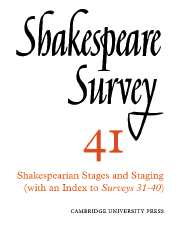Book contents
- Frontmatter
- The Shakespearian Stages, Forty Years On
- The Original Staging of The First Part of the Contention (1594)
- Charles Calvert’s Henry V
- Hamlet, An Apology for Actors, and The Sign of the Globe
- ‘Hid indeed within the centre’: The Hall/Finney Hamlet
- Malvolio and the Dark House
- The Text of Cressida and Every Ticklish Reader: Troilus and Cressida, The Greek Camp Scene
- Antony and Cleopatra, Act 4 Scene 16: ‘A Heavy Sight’
- The Tempest’s Tempest at Blackfriars
- Keats and Lucrece
- The Resources of Characterization in Othello
- Ovid and the Mature Tragedies: Metamorphosis in Othello and King Lear
- The Passing of King Lear
- Shakespeare Performances in London and Stratford-upon-Avon, 1986–7
- Professional Shakespeare Productions in the British Isles, January–December 1986
- The Year's Contributions to Shakespeare Studies: 1 Critical Studies
- 2 Shakespeare’s Life, Times, and Stage
- 3 Editions and Textual Studies
- Books Received
- Index to Volume 41
- General Index to Volumes 31-40
The Passing of King Lear
Published online by Cambridge University Press: 28 March 2007
- Frontmatter
- The Shakespearian Stages, Forty Years On
- The Original Staging of The First Part of the Contention (1594)
- Charles Calvert’s Henry V
- Hamlet, An Apology for Actors, and The Sign of the Globe
- ‘Hid indeed within the centre’: The Hall/Finney Hamlet
- Malvolio and the Dark House
- The Text of Cressida and Every Ticklish Reader: Troilus and Cressida, The Greek Camp Scene
- Antony and Cleopatra, Act 4 Scene 16: ‘A Heavy Sight’
- The Tempest’s Tempest at Blackfriars
- Keats and Lucrece
- The Resources of Characterization in Othello
- Ovid and the Mature Tragedies: Metamorphosis in Othello and King Lear
- The Passing of King Lear
- Shakespeare Performances in London and Stratford-upon-Avon, 1986–7
- Professional Shakespeare Productions in the British Isles, January–December 1986
- The Year's Contributions to Shakespeare Studies: 1 Critical Studies
- 2 Shakespeare’s Life, Times, and Stage
- 3 Editions and Textual Studies
- Books Received
- Index to Volume 41
- General Index to Volumes 31-40
Summary
Generations of scholars have grappled with the problems posed by the ending of Shakespeare's King Lear: not one of the solutions proposed to date has commanded general and lasting assent. As Bridget Lyons put it:
Lear's words just before his death have always eluded the attempts of critics to label what he sees, does or feels at the moment that he utters them.
Such critical attempts have been varied in the extreme: for G. R. Hibbard, they range from the 'sentimental wishful thinking' of writers such as Paul N. Siegel to the 'reductive nihilistic rant' of Jan Kott. Reactions to these attempts have been equally varied: what to one scholar is sublime is ridiculous to another. As a result, one senses the tendency, at the present time, to feel that this is perhaps one of the Shakespearian mysteries we are not intended to solve: that we should be content to say of Lear, as the churlish priest said of Ophelia, that his end was doubtful. It is therefore clear that any further attempt to provide a solution to the enigma must, if it is to have the slightest hope of carrying conviction, be based on foundations laid with the very greatest care. I shall thus begin by inviting assent to a certain number of premises essential to my later arguments.
- Type
- Chapter
- Information
- Shakespeare Survey , pp. 145 - 158Publisher: Cambridge University PressPrint publication year: 1989

